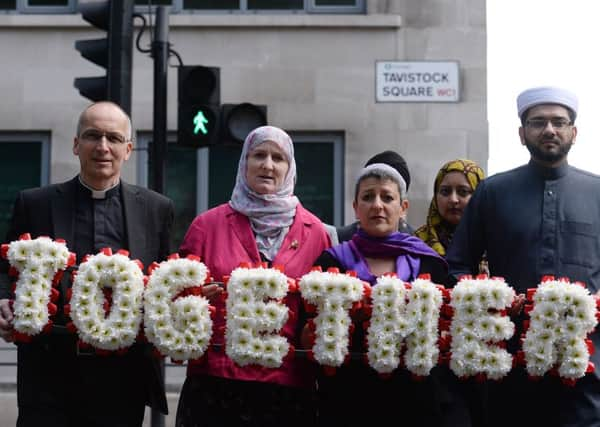Leaders: 7/7 ‘walk together’ may make us stronger


A decade ago, the attacks represented the unthinkable. Suicide bombers were always possible, but we had never before had to face the reality that they would strike at the heart of British society. For all the devastation caused by the IRA, this was another level of threat entirely, one which had the ability to plant a bomb virtually anywhere at any time. The loss of 52 civilian lives showed just how vulnerable we were.
Mercifully, there has been no repeat in the UK, but the slaughter of 30 British citizens on a beach in Tunisia only a matter of days ago is all the evidence we need that the current threat is harder to counter than ever.
Advertisement
Hide AdAdvertisement
Hide AdMetropolitan Police Assistant Commissioner Mark Rowley said yesterday: “We are not simply confronting a terrorist organisation like al-Qaeda or like the IRA which plots and plans what it wants to do secretly.”
It’s a chilling thought. What we face is a deadlier challenge than al-Qaeda.
How we counter or deny this threat has occupied minds since the carnage in Tunisia. After the 7/7 attacks, did we do enough to increase security measures? The lack of a repeat perhaps suggests so, but no-one could say with any confidence that we are safer than we were ten years ago. Life goes on, but the threat is ever-present.
There was a tightening up of security after 7/7, in much the same way as happened after September 11, but it would be an exaggeration to say that there has been a sea change in attitudes. And a sea change is what is required if the threat posed by terrorists in the UK is to be minimised.
To achieve this, we would have to accept the loss of liberties. We would have to agree to greater intrusion in our lives, specifically in our movements online and in mobile communication, if those plotting attacks are to be traced before they strike. We cannot squeal over the presence of big brother when the real threat is that posed by terrorists who we allow to use the technology at their disposal to take multiple innocent lives.
And only be getting a firmer grip of border controls, at whatever inconvenience to the public, can the movement of suspects be stemmed.
These are not popular measures in Britain’s relatively liberal society, but we may now find that they are a necessity.
Walking together could make us stronger, for a day. But what about tomorrow?
Prison vote decision must be clear-cut
Advertisement
Hide AdAdvertisement
Hide AdWhether prisoners should get the vote or not is a long-running stand-off between the UK and the European Court of Human Rights. On four occasions, the court has ruled against the UK policy of denying prisoners a vote at elections, the most recent judgment coming in February this year.
So far, any attempt to change existing practice has failed despite these European rulings. Now Scottish Labour Party leadership candidate Ken Macintosh has come up with a bid to introduce a middle-ground solution in Scotland, by suggesting that some convicted prisoners should be allowed a vote, while more serious offenders would continue to be denied the franchise.
According to Mr Macintosh, the degree of severity of offence should be taken into account. Those sentenced for non-violent crimes or some of those who have demonstrated “good behaviour” and shown “shame” for their crimes should be given the vote, he suggests.
This proposal is simply not practical. The factors which determine who goes to prison, and what leniency he or she can shown when serving sentence, are many and varied. Adding the right to vote to the mix would require the creation of a ruling body to assess each claim on a case-by-case basis.
Allowing or denying the vote will not assist rehabilitation and reduce re-offending, and nor will it solve the Scottish Labour Party’s problems as it looks ahead to Holyrood elections next year. This matter should remain black and white: either prisoners get the vote, or they do not. Attempting a halfway house achieves nothing.